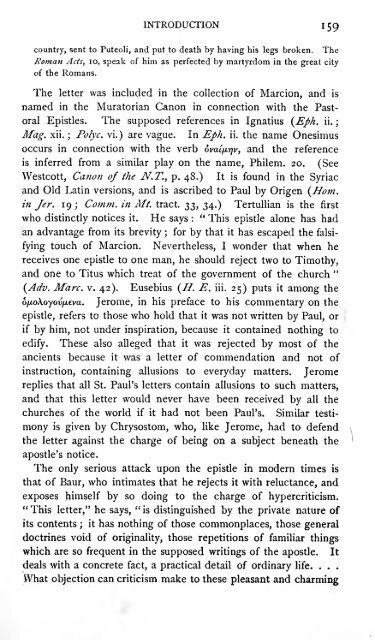Philippians and Philemon - MR Vincent - 1906.pdf
Philippians and Philemon - MR Vincent - 1906.pdf
Philippians and Philemon - MR Vincent - 1906.pdf
Create successful ePaper yourself
Turn your PDF publications into a flip-book with our unique Google optimized e-Paper software.
INTRODUCTION 1 59<br />
country, sent to Puteoli, <strong>and</strong> put to death by having his legs broken. The<br />
Roman Acts, 10, speak of him as perfected by martyrdom in the great city<br />
of the Romans.<br />
The letter was included in the collection of Marcion, <strong>and</strong> is<br />
named in the Muratorian Canon in connection with the Past-<br />
oral Epistles. The supposed references in Ignatius {Eph. ii.<br />
Mag. xii. ; Polyc. vi.) are vague. In Eph. ii. the name Onesimus<br />
occurs in connection with the verb,<strong>and</strong> the reference<br />
is inferred from a similar play on the name, Philem. 20. (See<br />
Westcott, Canon of ihe N.T., p. 48.) It is found in the Syriac<br />
<strong>and</strong> Old Latin versions, <strong>and</strong> is ascribed to Paul by Origen {Horn,<br />
in Jer. 19 ; Comm. in Mi. tract. 33, 34.) TertuUian is the first<br />
who distinctly notices it. He says : " This epistle alone has had<br />
an advantage from its brevity ; for by that it has escaped the falsi-<br />
fying touch of Marcion. Nevertheless, I wonder that when he<br />
receives one epistle to one man, he should reject two to Timothy,<br />
<strong>and</strong> one to Titus which treat of the government of the church "<br />
{Adv. Marc. v. 42). Eusebius {H. E. iii. 25) puts it among the<br />
//£. Jerome, in his preface to his commentary on the<br />
epistle, refers to those who hold that it was not written by Paul, or<br />
if by him, not under inspiration, because it contained nothing to<br />
edify. These also alleged that it was rejected by most of the<br />
ancients because it was a letter of commendation <strong>and</strong> not of<br />
instruction, containing allusions to everyday matters. Jerome<br />
replies that all St. Paul's letters contain allusions to such matters,<br />
<strong>and</strong> that this letter would never have been received by all the<br />
churches of the world if it had not been Paul's. Similar testimony<br />
is given by Chrysostom, who, like Jerome, had to defend<br />
the letter against the charge of being on a subject beneath the<br />
apostle's notice.<br />
The only serious attack upon the epistle in modern times is<br />
that of Baur, who intimates that he rejects it with reluctance, <strong>and</strong><br />
exposes himself by so doing to the charge of hypercriticism.<br />
" This letter," he says, " is distinguished by the private nature of<br />
its contents ; it has nothing of those commonplaces, those general<br />
doctrines void of originality, those repetitions of familiar things<br />
which are so frequent in the supposed writings of the apostle. It<br />
deals with a concrete fact, a practical detail of ordinary Hfe. . . .<br />
What objection can criticism make to these pleasant <strong>and</strong> charming<br />
;





